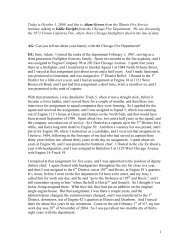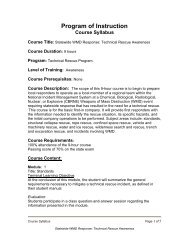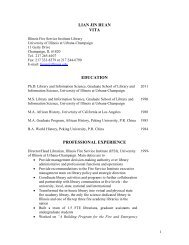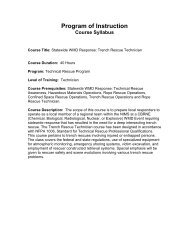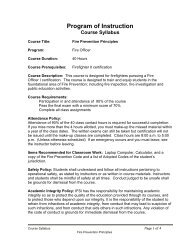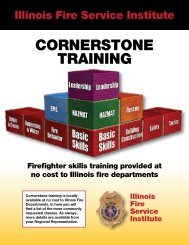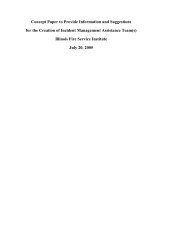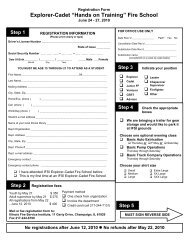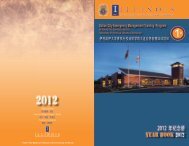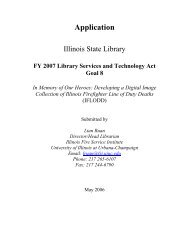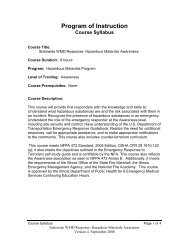Fire and Arson Investigation III.pdf
Fire and Arson Investigation III.pdf
Fire and Arson Investigation III.pdf
You also want an ePaper? Increase the reach of your titles
YUMPU automatically turns print PDFs into web optimized ePapers that Google loves.
Program of Instruction<br />
Course Syllabus<br />
Course Title: <strong>Fire</strong> & <strong>Arson</strong> <strong>Investigation</strong> – Module 3<br />
Program:<br />
<strong>Investigation</strong><br />
Edition: January 2012<br />
Course Duration:<br />
Course Enrollment:<br />
40 hours<br />
Member of fire or police department (or approved agency).<br />
Course Prerequisite: <strong>Fire</strong> & <strong>Arson</strong> <strong>Investigation</strong> – Module 2<br />
Course Description:<br />
This is the third module of three 40-hour classes designed as the foundational level of<br />
education <strong>and</strong> training for fire <strong>and</strong> arson investigators. The program meets the Job<br />
Performance Requirements of NFPA 1033 “Professional Qualifications for <strong>Fire</strong><br />
Investigator.” The investigation program includes comprehensive courses covering<br />
multiple topics <strong>and</strong> requiring significant student participation, reading <strong>and</strong> homework<br />
activity. Module <strong>III</strong> includes the following topics: <strong>Fire</strong> <strong>and</strong> explosion deaths <strong>and</strong> injuries,<br />
appliances, motor vehicle fires, wild fire investigations, management of complex<br />
investigations <strong>and</strong> marine fire investigations. The text book included with the course is<br />
“<strong>Fire</strong> Investigator: Principles <strong>and</strong> Practice.” Primary resources for the program are NFPA<br />
921 “Guide for <strong>Fire</strong> <strong>and</strong> Explosion <strong>Investigation</strong>s” <strong>and</strong> “Kirk’s <strong>Fire</strong> <strong>Investigation</strong>.” The<br />
practical requirements for the class are individual <strong>and</strong> group investigations of instructor<br />
designed vehicle fires. Students must successfully complete Modules I & II in order to<br />
attend Module <strong>III</strong>. The end of course exam is approved as the Office of the State <strong>Fire</strong><br />
Marshal certification exam. The fee for Module <strong>III</strong> is $250. <strong>Fire</strong>fighting gear is not<br />
required for the class but old clothes, gloves <strong>and</strong> work boots are recommended for the<br />
practical activity. Students are encouraged to bring personal cameras for the practical<br />
activity. Only the text book is provided with the program for students to keep <strong>and</strong> will be<br />
distributed the first day of Module 1 <strong>and</strong> should be brought to Modules 2 & 3. An NFPA<br />
921 is provided for students to use as a reference during the class but is not included for<br />
the student to keep. Students are encouraged to bring any reference material that they<br />
feel might be helpful to them.<br />
<strong>Fire</strong> & <strong>Arson</strong> <strong>Investigation</strong> Page 1 of 5<br />
Module 3 – Syllabus<br />
January 2012
Course Requirements:<br />
Students are expected to attend or make up all class hours in this course since it leads<br />
to a state level certification. Students are expected to attend class on time <strong>and</strong> to<br />
remain in class for the duration of the course. A student MUST COMPLETE all portions<br />
of this course, both classroom <strong>and</strong> practical in order to establish eligibility to sit for the<br />
end-of-course exam.<br />
Course Policies:<br />
Students are expected to utilize a “team” approach to the course discussion <strong>and</strong> activities.<br />
Students with experience or background in fire investigation are encouraged to share<br />
their experiences <strong>and</strong> help support less experienced students. The investigation program<br />
includes comprehensive courses covering multiple topics <strong>and</strong> requiring significant student<br />
participation, reading <strong>and</strong> homework activity.<br />
Safety Policy:<br />
Students shall underst<strong>and</strong> <strong>and</strong> follow all instructions pertaining to operational safety, as<br />
stated by instructors or as written in course materials. Instructors <strong>and</strong> students shall be<br />
mindful of safety at all times. Conduct judged to be unsafe shall be grounds for dismissal<br />
from the course.<br />
Academic Integrity Policy:<br />
IFSI has the responsibility for maintaining academic integrity so as to protect the quality of<br />
the education provided through its courses, <strong>and</strong> to protect those who depend upon our<br />
integrity. It is the responsibility of the student to refrain from infractions of academic<br />
integrity, from conduct that may lead to suspicion of such infractions, <strong>and</strong> from conduct<br />
that aids others in such infractions. Any violation of the code of conduct is grounds for<br />
immediate dismissal from the course.<br />
Evaluation Strategy:<br />
The instructor will observe individual student participation in the classroom <strong>and</strong> group<br />
discussions. The instructor will collect <strong>and</strong> review required course material. A written<br />
exam utilizing Pro-Board testing st<strong>and</strong>ards will be completed by the student with 70%<br />
accuracy.<br />
<strong>Fire</strong> & <strong>Arson</strong> <strong>Investigation</strong> Page 2 of 5<br />
Module 3 – Syllabus<br />
January 2012
Grading Policy:<br />
All grading of exams shall be conducted by IFSI staff in the Champaign office.<br />
Grades will be posted on line. All grading of practical exercises shall be based<br />
upon the st<strong>and</strong>ards set by the regulatory agency referenced in the course material<br />
<strong>and</strong> IFSI. Decisions regarding practical grades <strong>and</strong> certificates of course completion<br />
shall be made by the Program Director.<br />
Textbook:<br />
“<strong>Fire</strong> Investigator: Principles <strong>and</strong> Practice” 3 rd edition<br />
Reference List:<br />
NFPA 1033 “Professional Qualifications for <strong>Fire</strong> Investigator”<br />
NFPA 921 “Guide for <strong>Fire</strong> <strong>and</strong> Explosion <strong>Investigation</strong>s”<br />
“Kirk’s <strong>Fire</strong> <strong>Investigation</strong>”<br />
Course Content<br />
Chapter 21: <strong>Fire</strong> <strong>and</strong> Explosion Deaths <strong>and</strong> Injuries<br />
Chapter 22: Appliances<br />
Chapter 23: Motor Vehicle <strong>Fire</strong>s<br />
Chapter 24: Wildfire <strong>Investigation</strong>s<br />
Chapter 25: Management of Complex <strong>Investigation</strong>s<br />
Chapter 26: Marine <strong>Fire</strong> <strong>Investigation</strong>s<br />
<strong>Fire</strong> & <strong>Arson</strong> <strong>Investigation</strong> Page 3 of 5<br />
Module 3 – Syllabus<br />
January 2012
Course Schedule <strong>and</strong> Student Reading Assignments:<br />
40-hour Format: Monday through Friday 8:00am – 5:00pm<br />
Class Session Text Chapter Subject Duration<br />
1 21 <strong>Fire</strong> <strong>and</strong> Explosion Deaths <strong>and</strong> Injuries 4 hours<br />
1 22 Appliances 3 hours<br />
1 Case Review Activity 1 hour<br />
(8 hours)<br />
2 23 Motor Vehicle <strong>Fire</strong>s 5 hours<br />
2 24 Wild <strong>Fire</strong> <strong>Investigation</strong>s 3 hours<br />
(8 hours)<br />
3 Individual <strong>Fire</strong> <strong>Investigation</strong> Activity 3 hours<br />
3 Group <strong>Fire</strong> <strong>Investigation</strong> Activity 4 hours<br />
3 Group Preparation Activity 1 hour<br />
(8 hours)<br />
4 Group Presentation Activity 3 hours<br />
4 25 Management of Complex <strong>Investigation</strong>s 1 hour<br />
4 26 Marine <strong>Fire</strong> <strong>Investigation</strong> 2 hours<br />
(7 hours)<br />
5 NIMMS Video (from NFA) 1 hour<br />
5 26 Marine <strong>Fire</strong> <strong>Investigation</strong> 2 hours<br />
5 Review 1 hour<br />
Exam<br />
1 hour<br />
(5 hours)<br />
40 Hours Total<br />
(Includes 4<br />
hours reading)<br />
<strong>Fire</strong> & <strong>Arson</strong> <strong>Investigation</strong> Page 4 of 5<br />
Module 3 – Syllabus<br />
January 2012
Course Schedule <strong>and</strong> Student Reading Assignments:<br />
Weekend Format: Friday 6:00pm-10:00pm, Saturday & Sunday 8:00am-5:00pm<br />
Class Session Text Chapter Subject Duration<br />
1 st Friday Evening 21 <strong>Fire</strong> Explosion Deaths <strong>and</strong> Injuries 4 hours<br />
1 st Saturday 22 Appliances 3 hours<br />
1 st Saturday 23 Motor Vehicle <strong>Fire</strong>s 4 hours<br />
1 st Saturday Case Review Activity 1 hour<br />
(8 hours)<br />
1 st Sunday 23 Motor Vehicle <strong>Fire</strong>s 2 hours<br />
1 st Sunday 24 Wild <strong>Fire</strong> <strong>Investigation</strong>s 4 hours<br />
1 st Sunday 25 Management of Complex <strong>Investigation</strong>s 1 hour<br />
1 st Sunday Case Review Activity 1 hour<br />
(8 hours)<br />
2 nd Friday Evening 26 Marine <strong>Fire</strong> <strong>Investigation</strong>s 3 hours<br />
2 nd Friday Evening Case Review Activity 1 hour<br />
(4 hours)<br />
2 nd Saturday Individual <strong>Fire</strong> <strong>Investigation</strong> Activity 4 hours<br />
2 nd Saturday Group <strong>Fire</strong> <strong>Investigation</strong> Activity 4 hours<br />
(8 hours)<br />
2 nd Sunday Group Preparation Activity 2 hours<br />
2 nd Sunday Group Presentation Activity 4 hours<br />
2 nd Sunday Review 1 hour<br />
2 nd Sunday Exam 1 hour<br />
(8 hours)<br />
40 Hours Total<br />
<strong>Fire</strong> & <strong>Arson</strong> <strong>Investigation</strong> Page 5 of 5<br />
Module 3 – Syllabus<br />
January 2012



